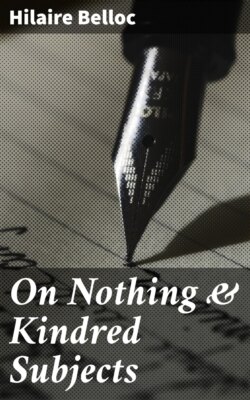Читать книгу On Nothing & Kindred Subjects - Hilaire Belloc - Страница 4
На сайте Литреса книга снята с продажи.
TO NOTHING THE HUMAN RACE IN GRATITUDE.
ОглавлениеSo I began to write my book, Maurice: and as I wrote it the dignity of what I had to do rose continually before me, as does the dignity of a mountain range which first seemed a vague part of the sky, but at last stands out august and fixed before the traveller; or as the sky at night may seem to a man released from a dungeon who sees it but gradually, first bewildered by the former constraint of his narrow room but now gradually enlarging to drink in its immensity. Indeed this Nothing is too great for any man who has once embraced it to leave it alone thenceforward for ever; and finally, the dignity of Nothing is sufficiently exalted in this: that Nothing is the tenuous stuff from which the world was made.
For when the Elohim set out to make the world, first they debated among themselves the Idea, and one suggested this and another suggested that, till they had threshed out between them a very pretty picture of it all. There were to be hills beyond hills, good grass and trees, and the broadness of rivers, animals of all kinds, both comic and terrible, and savours and colours, and all around the ceaseless streaming of the sea.
Now when they had got that far, and debated the Idea in detail, and with amendment and resolve, it very greatly concerned them of what so admirable a compost should be mixed. Some said of this, and some said of that, but in the long run it was decided by the narrow majority of eight in a full house that Nothing was the only proper material out of which to make this World of theirs, and out of Nothing they made it: as it says in the Ballade:
Dear, tenuous stuff, of which the world was made.
And again in the Envoi:
Prince, draw this sovereign draught in your despair,
That when your riot in that rest is laid,
You shall be merged with an Essential Air:—
Dear, tenuous stuff, of which the world was made!
Out of Nothing then did they proceed to make the world, this sweet world, always excepting Man the Marplot. Man was made in a muddier fashion, as you shall hear.
For when the world seemed ready finished and, as it were, presentable for use, and was full of ducks, tigers, mastodons, waddling hippopotamuses, lilting deer, strong-smelling herbs, angry lions, frowsy snakes, cracked glaciers, regular waterfalls, coloured sunsets, and the rest, it suddenly came into the head of the youngest of these strong Makers of the World (the youngest, who had been sat upon and snubbed all the while the thing was doing, and hardly been allowed to look on, let alone to touch), it suddenly came into his little head, I say, that he would make a Man.
Then the Elder Elohim said, some of them, "Oh, leave well alone! send him to bed!" And others said sleepily (for they were tired), "No! no! let him play his little trick and have done with it, and then we shall have some rest." Little did they know!… And others again, who were still broad awake, looked on with amusement and applauded, saying: "Go on, little one! Let us see what you can do." But when these last stooped to help the child, they found that all the Nothing had been used up (and that is why there is none of it about to-day). So the little fellow began to cry, but they, to comfort him, said: "Tut, lad! tut! do not cry; do your best with this bit of mud. It will always serve to fashion something."
So the jolly little fellow took the dirty lump of mud and pushed it this way and that, jabbing with his thumb and scraping with his nail, until at last he had made Picanthropos, who lived in Java and was a fool; who begat Eoanthropos, who begat Meioanthropos, who begat Pleioanthropos, who begat Pleistoanthropos, who is often mixed up with his father, and a great warning against keeping the same names in one family; who begat Paleoanthropos, who begat Neoanthropos, who begat the three Anthropoids, great mumblers and murmurers with their mouths; and the eldest of these begat Him whose son was He, from whom we are all descended.
He was indeed halting and patchy, ill-lettered, passionate and rude; bald of one cheek and blind of one eye, and his legs were of different sizes, nevertheless by process of ascent have we, his descendants, manfully continued to develop and to progress, and to swell in everything, until from Homer we came to Euripides, and from Euripides to Seneca, and from Seneca to Boethius and his peers; and from these to Duns Scotus, and so upwards through James I of England and the fifth, sixth or seventh of Scotland (for it is impossible to remember these things) and on, on, to my Lord Macaulay, and in the very last reached YOU, the great summits of the human race and last perfection of the ages READERS OF THIS BOOK, and you also Maurice, to whom it is dedicated, and myself, who have written it for gain.
Amen._
